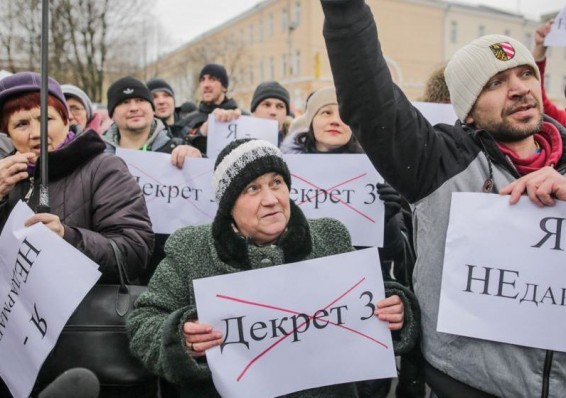Belarusian authorities bar opposition from protest groups in regions
 The situation has not changed
The situation has not changed

The authorities have barred the opposition from communicating with new protest groups in the regions through preventive detentions, arrests and blocking of regional activists. Meanwhile, the security forces have held back the clampdown on the unauthorized opposition rally in Minsk to create a positive image for the EU. The authorities are likely to allow conventional unauthorised opposition activity under usual slogans, however would harshly resist the opposition’s attempts to establish contacts with the new protest groups among the population.
The Belarusian opposition invited Belarusians to several May Day/Labour Day protest actions in 2017.
The Belarusian authorities seem ready to stop the protest activity with repressions and preventive detentions, however, they refrain from flexing the muscle and making new political prisoners in order not to deteriorate relations with Western capitals. The Belarusian authorities have used different approaches to official and opposition events on May Day in different cities. Amid low popularity ratings of state institutions and people’s discontent with the state socio-economic policy, the authorities are attempting to preserve low political mobilisation in society. Except for a massive rally in Mogilev, the authorities have not organised large-scale official rallies in other cities. According to media reports, the official May Day demonstration in the Victory Park in Minsk gathered only few participants and was not broadly advertised.
Despite numerous requests from the opposition to hold May Day rallies in different regions, Gomel was the only city, which authorised the opposition rally. In Minsk, independent trade unions, For Freedom, the United Civic Party and the Belarusian Helsinki Committee abandoned the truncated version of a meeting without a rally authorised by the authorities, which created tension between them and Statkevich-led the Belarusian National Congress. The BNC accused the organisers of an attempt to disrupt the unauthorised procession from the Oktyabrskaya Square to the Independence Square. It should be noted that political activists traditionally take part in unauthorized protests in Minsk.
In the regions, the authorities were less compromising, which was likely to be due to higher tension in society and greater mobilisation potential among the new protest groups. That said, during protests in February-March 2017, regions demonstrated high levels of open discontent and massive protest activity with socio-economic demands, involving traditional electorate of the authorities.
Overall, tension between supporters of unauthorised street activity and those supporting conflict free public activity has grown. Meanwhile, the population appears unwilling to join political protests, and the opposition is failing to engage new protest groups, which participated in unauthorised opposition activity in the regions in February-March. The authorities have managed to stop street protests by isolating regional leaders (preventive detentions, arrests, blockages and fines), suspending the decree on social dependants and thanks to the start of the ‘dacha season’.
Subscribe to our newsletter




Situation in Belarus
Constitutional referendum: main consequences


 Video
Video
How to count the political prisoners: are the new criteria needed?


 Video
Video
Paternalism In Decline, Belarusian Euroscepticism, And The Influence Of Russia


 Video
Video











